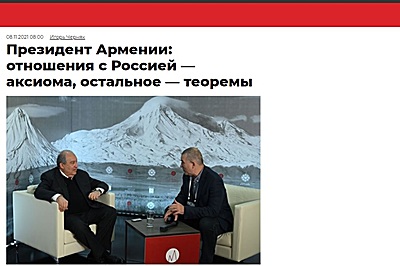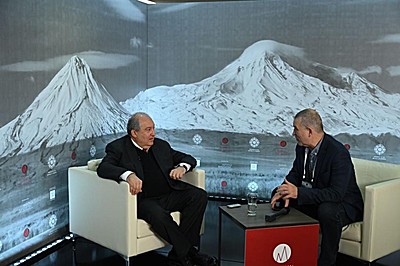Interviews and press conferences
Theorems and Axioms. Interview of the President of the Republic Armen Sarkissian to the Russian periodical Arguments and Facts
President Armen Sarkissian gave an interview to Igor Chernyak, editor-in-chief of the authoritative Russian periodical Arguments and Facts. Below, you will find the abridged translation of the preface and interview of the newspaper.
Russian-Armenian relations have not been easy in recent years. Yerevan made various comments on our country (Russia), even to the point that Moscow is to blame for Armenia's defeat in Nagorno-Karabakh. What is happening? President of Armenia Armen Sarkissian answered the A&F editor-in-Chief Igor Chernyak’s questions.
- Mr. President, in the past few years, radical changes have taken place in Armenia: the country went through a revolution, a war, and twice snap parliamentary elections in three years. At this, before that, Armenia changed the Constitution, moving from a presidential system of governing to a parliamentary one. The current leadership of the country announces that it intends to continue the direction of large-scale reforms. Can these changes have any effect on relations with Russia?
- I think the decision to change Armenia from a presidential to a parliamentary system was not right. As a result, the Republic became more prime ministerial. The current Constitution has many shortcomings, I am for changing it so that it becomes balanced. Otherwise, all of this could lead to serious consequences in the future.
Ordinary citizens do not understand what a parliamentary republic is. Let's take to the streets and ask anyone there why the president fails to appoint a good minister or fire someone. An ordinary citizen will not answer you.
The problem is that people who have experience, have been educated in the West or in the East, cannot come home today to serve their country because our Constitution does not allow it. To become a minister, you must live in Armenia for four years, and be a citizen of Armenia only. It takes ten years to become president. I do not understand why. Everything in the world interconnects. Armenia needs people who know the world, world trends, have information, and are professionals.
- Who are you talking about?
- For example, Nubar Afeyan, who developed the Moderna vaccine in Boston, cannot become the Minister of Science of Armenia. For that, he has to give up his American or Canadian passport, come here and live for four years. But if he lived in Armenia for four years, how would he create Moderna? That is why I consider the constitutional amendments an important goal. It is necessary to open the roads, to break the Berlin Wall between the Armenians living in Armenia and in the Diaspora...
Yes, Armenia must have good relations with all the countries in the world. It would be desirable to resolve the issues with Azerbaijan, although it is difficult. It would not be bad to have good relations with Turkey, which is more complex.
However, among all countries, there is one, with which it is pointless to discuss relations. It is Russia because it is impossible to discuss what exists a priori. There are theorems and axioms in mathematics. Armenia’s relations with a third country are a theorem, and its relations with Russia are an axiom. We lived for several hundred years in the Ottoman Empire, and then, in the Russian Empire. As a result, the Armenian Republic that existed in the Russian Empire is today independent Armenia. And where is Western Armenia, which was in the Ottoman Empire? Where are the Armenians who lived there? There are as many Armenians in Russia today as in Armenia. And in Turkey, they were more...
You asked if the current changes could affect relations with Russia. The important thing is that I do not even want to discuss the strength of the friendship between our countries. It's an axiom for me.
High-tech, Armenian Technologies
- How do you assess the level of economic cooperation with Russia? In 2020, the volume of mutual trade decreased by 8%, to only $2 billion.
- Again, those percentages are not for me, they are for the government. I can talk on trends and strategy. And the strategy is simple. Armenia can become a base country for Russia to develop certain areas, as it was in the Soviet era. Armenia has the opportunity to attract people, know-how from the West, the United States, the whole world, and become a country of new technologies. Is that good for Russia? Yes, it is just wonderful.
My dream is that Armenia becomes a country of high technologies. High-tech means high technologies. The Armenian people call themselves “հայ,”
pronounced like the English word ‘high.’ We call our country Hayastan, a country of Armenians. So, I am Armenian, and I dream that we have High-Tech, that is, Armenian technologies.
A simple example. You can get grape juice and sell it in Russia, Bulgaria, or Sweden. He can sell raisins, wine, champagne. But the masterpiece of art is brandy. It is more difficult to get brandy from the same grape, but the price is incomparably higher. And that brandy is an example of Armenian high-tech (high technologies).
Or, for example, I cannot compete with Uzbekistan or Turkey in the quantity of tomatoes. This means that what is produced from Armenian tomatoes must be high-tech. I do not compete in amount, but I can compete in quality. The same goes for programming, artificial intelligence, biotechnologies, and so on.
- How do you assess the work of Russian peacekeepers in Karabakh, how long will their presence there be necessary?
- Always. I do not know if you can find the correct word to convey my feelings. The Russian army has been in the region for decades, and hundreds of years. Its presence is too important. What the peacekeepers are doing is of great importance both in terms of regional policy and the status of Karabakh, the future of the region, and possible negotiations to rule out war tomorrow.
I must take this opportunity and thank the peacekeepers through you: they are soldiers, after all. They could serve quietly in Russia without a headache because who can guarantee that nothing will happen to us tomorrow? However, Vladimir Vladimirovich, and the leadership of your country made a difficult decision, and I want to thank them for that.
- In your opinion, what are the reasons for Armenia's defeat in the Second War? Is a third possible?
- Let us leave the third chance to God. We won the first war because we were two-three years ahead of Azerbaijan in organizing the armed forces, using the Armenians who served in the Soviet army and fought in Afghanistan. Yes, there was Turkey at that time as well, but not in such volumes, and NATO had not used its weapons so openly.
Then came the 26 years following the war. We had a great opportunity to turn our victory into a lasting peace. But we did not use it. And we started to seriously fall behind. Since Azerbaijan, still under the leadership of Heydar Aliyev, realized that its advantage was oil, and did its best to bring their oil to the international market. As a result, over time, we lost all the advantages. In addition, Azerbaijan bought large quantities of ammunition, openly brought NATO weapons to the battlefield through Turkey, and recruited thousands of mercenaries from around the world. In Brussels, I directly asked my colleagues, what do you think about the fact that a NATO member state has gone to war with Armenia? Naturally, I did not receive an answer.
- Do you consider Armenian-Turkish reconciliation possible, or is everything lost forever?
- The answer is trivial: nothing is eternal, neither the final victory, nor the final defeat. Everything is possible in this world. For example, France and Germany fought against each other for hundreds of years, but after World War II, everything changed. First, there was tolerance, tolerance for faith, culture, and communication. Were it not for that, medieval wars in Europe would continue to this very day.
I think in this case, Turkey should take the initiative: tolerance for culture, history, monuments, faith, church, etc. Without it, without respect for each other, nothing will happen.
- There are regular rumors that Armenia may cooperate with NATO, which causes some tension in Russia. How likely do you think it is?
- This question should be addressed to the Prime Minister, the Ministers of Defense and Foreign Affairs. I have already stated my opinion on NATO, I have communicated it to the Secretary General of NATO. It is still unclear to me how it turned out that Turkey, a member of NATO, became a participant in that war. Armenia has 30 years of relations with NATO, it has even sent its soldiers to hotspots in different regions of the world ...
From Logunov to Putin
- As far as I know, you were friends with the rector of Moscow State University Logunov and legendary intelligence veteran Vardanyan, who lived in Moscow. Are there any friends left in Russia after they passed away?
- It is difficult for me to call Anatoly Alexeyevich Logunov a friend. He was an academician, and I was a young scientist working on a topic that interested him. But he always paid close attention to me, he had a great impact on my life.
And already Gevork Andreevich Vartanian was a friend, indeed, despite our age difference. His wife and my mother had been friends in Tehran when they were young. I met them in 1996, when I became Prime Minister because I wanted to strengthen the Armenian intelligence. Who, if not him, could be the chief adviser? Gevork Andreevich is the same to me, as Einstein is in physics. He was a great spy and a great man.
In general, I have always had many friends in Russia. But there was a friendship with Viktor Stepanovich Chernomyrdin, whom I will never forget. We met in 1985, and it turned out that we immediately became friends. When I became Prime Minister, many issues were resolved very quickly. During my first visit to Moscow, we created ArmGazProm, now called Gazprom Armenia. We thought overnight and signed a memorandum the next day.
- But Chernomyrdin died a long time ago. Is there something else that connects you with Russia?
- Everything connects. Vladimir Vladimirovich Putin connects, with whom we have good relations. Of course, interstate ties cannot be built on the likes or dislikes of the country's leaders. And yet, personal relationships matter a lot. I am connected with Russia by many of my friends in science and business. My life connects me because I am, after all, a Soviet person. In Moscow, I feel at home, though, for example, in Almaty I also feel at home. During my student years, I visited Tashkent, Samarkand, Bukhara, it's all part of my life. And Russia even more.
Besides, I am connected with Russia by the great Russian culture: literature, language, art, music; I have many friends among musicians and composers. I was surprised that you thought I had only two friends in Russia.

